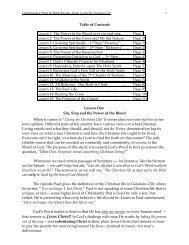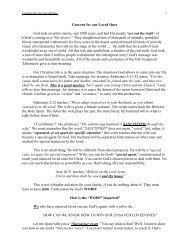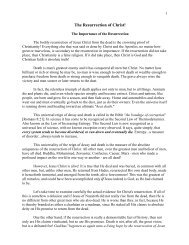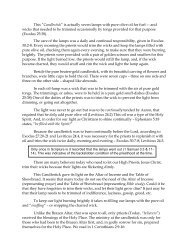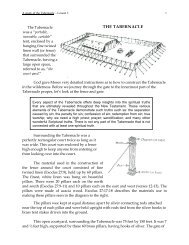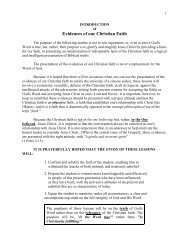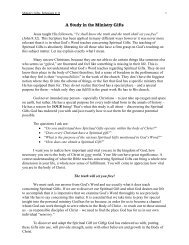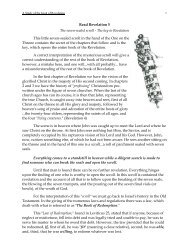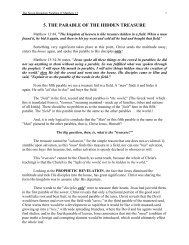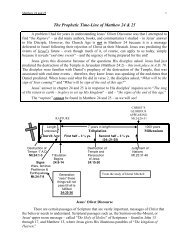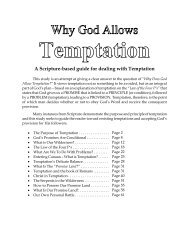ALLEGED BIBLE CONTRADICTIONS - NetBibleStudy.com
ALLEGED BIBLE CONTRADICTIONS - NetBibleStudy.com
ALLEGED BIBLE CONTRADICTIONS - NetBibleStudy.com
Create successful ePaper yourself
Turn your PDF publications into a flip-book with our unique Google optimized e-Paper software.
3<br />
For example, because "God sees not as man sees," we have a tendency to<br />
question how God could say of David, who was not only guilty of adultery, but also<br />
murder, "he is a man after My own heart." The answer to this question is due to the<br />
fact that, "man looks at the outward appearance, but God looks at the heart." God<br />
could see David's heart was truly repentant, that, in spite of his sin, he had a sincere<br />
desire to life for Him. Despite the fact that David still had to suffer the consequences<br />
of his sin [Psalm 32:5] God forgave him and viewed him as a man after His own<br />
heart. Even though David sinned, his heart was fundamentally right toward God and<br />
he was a repentant and humble man, the kind of person who truly reaches the heart of<br />
God.<br />
(B) THE PRINCIPLE OF AN EXHAUSTIVE STUDY OF THE CONTEXT<br />
When one finds two statements in Scripture which appear to be<br />
contradictory, one must weigh every word within the context of which it was spoken<br />
if he hopes to understand what it is that God is saying. For example, in Exodus 20:13,<br />
God says, "Thou shalt not kill" [The Hebrew word used here means "murder"] and,<br />
yet, in Genesis 9:6, God says, "Whoso sheds man's blood, by man shall his blood be<br />
shed; for in the image of God He made man." [With this state- ment, which God<br />
made to Noah when He was making His covenant with him, God instituted the law of<br />
Capital Punishment.] How can we account for the seeming contradiction of these<br />
two statements The answer is, simply, that when God said, "Thou shalt not kill," He<br />
was saying that one man does not have the right to take the life of another because,<br />
when one man takes the initiative to kill another, it is "murder!" So, when God says,<br />
"Thou shalt not kill," what He is really saying is "Thou shalt not murder." However,<br />
on the other hand, when God says, "Whoso sheds man's blood, by man shall his blood<br />
be shed," He is saying that government, [which, immediately after the flood He<br />
<strong>com</strong>manded man to establish to represent Him in maintaining order and righteousness<br />
in human societies], does have the right, and authority, to take the life of another<br />
if that's what it takes to maintain law and order. Therefore, a soldier, who goes to war<br />
under government orders, because he represents governmental authority in carrying<br />
out this responsibility, is not guilt of <strong>com</strong>mitting "murder" when he kills another.<br />
(C) THE PRINCIPLE OF DRASTIC MEASURES<br />
Although we have already covered the subject of what seems to be God's<br />
severity, we mention it again simply because an understanding of the concepts that<br />
were covered on this subject, in a previous lesson, are pertinent to a study on<br />
seemingly Biblical contradictions, because, God's seeming "cruelty" appears to be a<br />
contradiction to the Biblical statement that "God is a "loving God!"<br />
In order to reconcile this seeming contradictions, we remind you, again, that it<br />
was the exceeding wickedness of sin, and the depth of depravity that certain<br />
civilizations had fallen into, that made it necessary for God to take such extreme,<br />
drastic, measures . . . [Like the destruction of the Canaanites, Sodom and Gomorrah,<br />
or, even Ananias and Sapphira in the New Testament] . . . to stop the spread of their<br />
wickedness, and evil, to others. So, what appears to be an act of "cruelty" on God's<br />
part is, really an act of "love" . . . a love that desires that others not be polluted by



